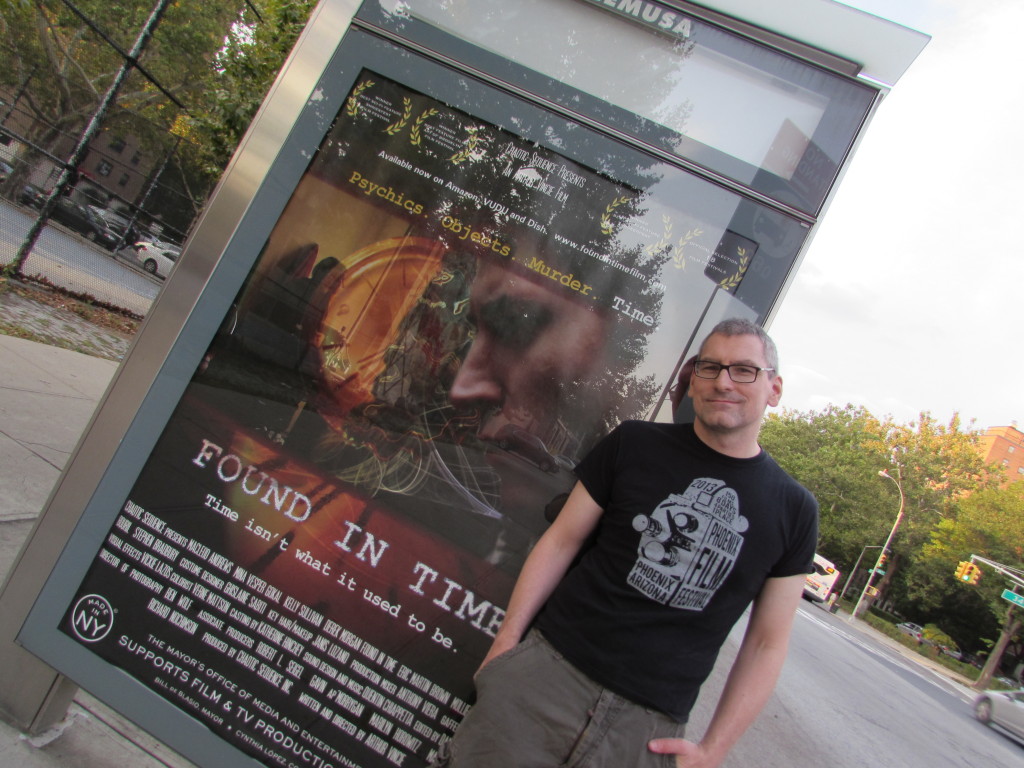Found In Time has just been released on Amazon, and user reviews are starting to come in. They confirm something that all of us suspected from the beginning – that this was a film that would divide audiences. Those who were expecting something more straightforward would be frustrated; those who could deal with more ambiguity would be happy. There’s nothing inherently good or bad about either attitude, by the way. Ambiguity can be a terrible thing (see Prometheus).
We’re still waiting on some festivals to get back to us, and our foreign sales rep, Summer Hill Films, is taking it to Cannes next month. We’re also still exploring other domestic distribution options – DVD, BluRay, and a soundtrack album.
But most of that is the work of the producer, at least in theory. At what point is the director done with a film? Is it when it’s wrapped? When post is finished? When it’s out at festivals? When it’s available online or in stores? The producer is on for the whole ride (unless the producer is only working for hire). What is the director’s role in this brave new world of the artist/entrepreneur?
J. Michael Straczynski, the creator of the tv series Babylon 5, somehow managed to write most of the 100+ episodes, EP the show, supervise the sound mix, run the online forums on AOL (hey, it was back in the day), and then went on to write follow-up movies, supervise comic and novel adaptations, and answer fan mail. At what point did he say ‘I’m done?’ The show went off the air sometime in the late 1990s but still has a loyal following. Until Firefly and Battlestar Galactica came along it was the gateway drug by which I introduced my non-geek friends to sci-fi. Does he still feel as connected to the show as he did all those years ago?
I’m wrestling with this issue now because I’m in the process of getting back into the director’s chair again for Bitter Child, but I don’t want to abandon Found In Time just at the moment when people are starting to see it. It’s been part of my life so long that I’m not even sure how I would go about leaving it… and yet whenever I work on Bitter Child part of me feels guilty. It’s an odd conundrum, and very different from what I’ve faced before.
By the time my first film, Caleb’s Door, was finished, I was really ready to be done with it and get on with the next project. That was a hundred internet years ago, when social media was just gaining traction and distributors were starting the now-familiar pattern of picking up films for a song and then putting them out into the marketplace with little if any promotion. The idea of the filmmaker taking up the promotion baton was seen as counterproductive (except for documentaries). Festivals were the main avenue for promoting a film.
I moved on to another project (which fell apart), then onto Found In Time. And the funny thing is, that while there are a lot of books out there on how to make your film, there are fewer on how to finish them, even fewer on how to distribute them, and none that I know of about how to do whatever happens after distribution. So I never really went through this before.
I can tell you that it’s a difficult process emotionally to untangle oneself from a project once its “finished,” and make plans for its entry into the world. Whenever I read the negative reviews, I wonder if I’ve made the film too inaccessible or too vague. Or I think that the marketing is off. Or I wonder if there’s a more ‘targeted’ distribution avenue out there.
Working on Bitter Child (and my television project, The Spectral City) is great, but it adds to the tension somewhat. It’s hard to work on more than one project at a time and give each one the proper attention and energy. And with The Spectral City, some more early-stage projects, and the need to make a living all jostling for attention. keeping sustained focus on any one thing can be difficult.
I still wake up every day happy to be in a position to make films and write and express myself, so don’t get the impression that it’s all doom and gloom. My grandparents and parents never had a chance to really pursue their artistic passions as fully as they would have liked. So I’m very lucky. This feeling of uncertainty about what my role is in regards to Found In Time – beyond being a sort of internet-age carnival barker (or wheatpaste band poster brigadier) – is something that’s akin to being a parent, I guess. We’ve raised the kid, and now it’s time to let it go and take on a supporting role in its life.


I just finished watching Found in Time on Amazon via Roku. It was transporting and entertaining. I loved the cityscape. It was smart and clever. I spent the first half of my childhood in the Bronx and was delighted to see glimpses of that beloved place, to see you use the empty places in New York, that evoked stories for me, the warehouses, the blank face of metal grills. It was another kind of city poem that the characters are selling on the street corner, that they are policed, harassed, assigned, managed, manipulated for some
alleged greater public good…. I cried for all the truths in the fiction. I was surprised that Spiderman was
sancutary ferryman touchstone vs. trickster as in some folklore. I loved the various psychic machineries– great fun; the protective headgear of the therapists; and how you slipped in the how of each one’s abilities. Good people make a mess, huh? What does a fish have to talk about with a boatman? Thank you for this narrative of a tide.